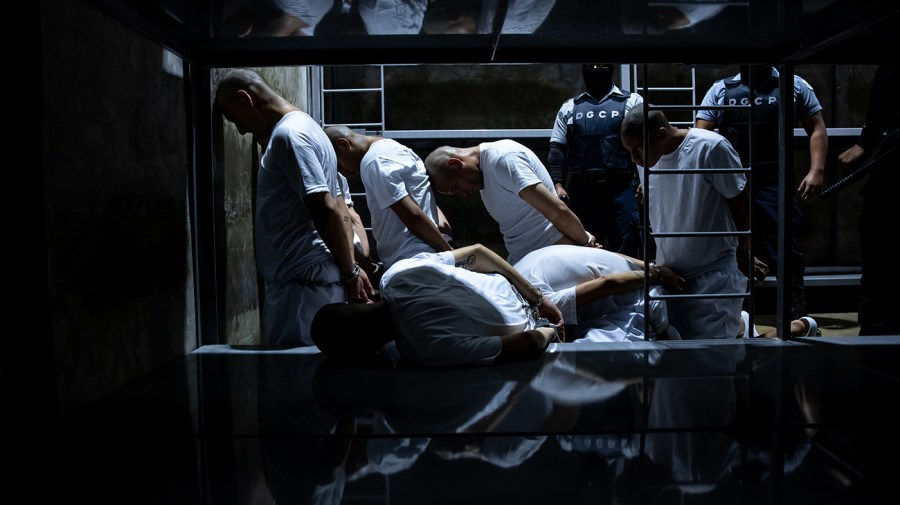
Boasberg floats contempt hearings on deportation flights, suspects 'bad faith' actions from Trump admin

U.S. District Court Judge James Boasberg hinted at possible contempt proceedings as he grilled a government lawyer Thursday about whether the Trump administration violated his court order by failing to turn around planes carrying migrants to a Salvadoran prison.
Boasberg made no decisions following a court hearing even as he otherwise pushed the administration to detail its timeline and decisionmaking as it loaded more than 200 migrants onto a plane amid a court battle to block the deportations.
He pushed back when a Justice Department attorney said the administration followed the law and his orders.
“It seems to me there’s a fair likelihood that that is not correct, in fact that the government acted in bad faith throughout that day. If you really believed everything you did that day was legal and could survive a court challenge, I can’t believe you ever would have operated the way you did,” Boasberg said.
He dove into the timeline of the Trump administration’s actions, from signing an order igniting the Alien Enemies Act on Friday, March 14, but not publicizing it until the next day to preparations for flights even as Boasberg scheduled a hearing.
The law allows the government to swiftly deport citizens of an enemy nation. President Trump has maintained the Tren de Aragua gang is acting at the behest of the Venezuelan government, using the war powers to deport Venezuelans. It’s the only time the law has been used to address gang activity.
Boasberg noted that he barred the Trump administration from deporting five of the men at 9:40 a.m. on Saturday, March 15, and scheduled hearings for later that day.
“Why when you knew that I was having a hearing … why wouldn’t the prudent thing be to say, ‘Let’s slow down here. Let’s see what the judge says. He’s already enjoined the removal of five people, it’s certainly in the realm of possibility that he would enjoin further removal. Let’s see what he says,’” Boasberg asked.
In dispute is whether the government violated an oral order from Boasberg given around 6:45 p.m. that day to halt or turn around any flights carrying migrants.
The White House has sought to sidestep that question, saying it complied with a 7:27 p.m. written order. In court, however, they have declined to provide Boasberg with flight details and have asserted the ability to do so under the state secrets privilege.
Boasberg on Thursday raised the specter that the administration’s delay in publicizing the proclamation could have been “trying to put measures in place to get people subject to the proclamation removed from the country before it’s possible to challenge” their deportation and before it could be blocked by a court.
Drew Ensign, a deputy assistant attorney general, denied that the administration took any actions to flout Boasberg’s order and said it was “reasonable that the government would have engaged in preparatory action before it began the national security operation.”
Boasberg also said he asked Ensign “point blank” whether there were plans to deport migrants in the next 24 or 48 hours.
Ensign said while he diligently tried to get that information, he was unable to.
At another point, Boasberg noted that eight women and one man were not accepted by El Salvador and were brought back to the U.S., something the judge says shows it was “certainly operationally feasible” to have returned migrants.
Boasberg also pushed Ensign to break down whom he told about his orders to turn around the planes, but got mixed responses, with the attorney offering some contacts but saying others would be covered by attorney-client privilege.
“Who made the decision to either not tell the pilots anything, or to tell them to keep going? I’d like to know who that was,” Boasberg said, noting that the government has argued it was “perfectly appropriate” to begin preparations for the flights.
“Who made that perfectly appropriate decision?” the judge asked. “How should I determine who the contemnor or contemnors are?”
Ensign said he did not know.
Boasberg said if he finds probable cause the government violated his order, there would likely be hearings.
The hearing then turned to the government’s invocation of the state secrets privilege to block the sharing of any flight details with Boasberg.
Ensign said he was not aware that the flight information contained any classified information.
Boasberg said he was unaware of an instance in which the government declined to share information with a judge that was not classified — and said courthouses have special facilities to allow for the review of such sensitive information.
The judge added that he was “struggling to see” how the state secrets privilege could be used for unclassified material.
Ensign said “there would be diplomatic consequences” to sharing the information.
The American Civil Liberties Union, which has sued over Trump’s use of the Alien Enemies Act, said Boasberg could likely determine whether the Trump administration violated his order based only on publicly available information about the flights.
Boasberg also referenced the case of Kilmar Abrego Garcia, a Maryland man and Salvadoran national who was deported under different immigration authorities but likewise taken to the Salvadoran prison.
Abrego Garcia was protected from removal by a judge’s 2019 order, and the Trump administration has said he was deported due to an administrative error.
Boasberg highlighted Abrego Garcia’s wrongful deportation.
“What you were willing to do by trying to do this as quickly as possible and avoid being enjoined by a court,” he said, “was to risk putting people on those planes who shouldn’t have been on the plane the first place.”